![Rooted in christ: Women Being the Church]()
by Steve | Jul 10, 2017 | July-August 2017, Magazine, Magazine Articles
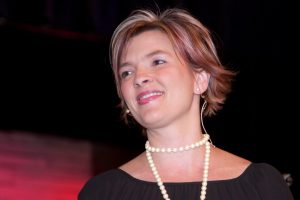
The Rev. Kelly Brumbeloe of Mt. Bethel United Methodist Church. Photo by Donna Lachance.
By Katy Kiser-
What should be the business of the church? For the women of the Mt. Bethel United Methodist Church in Marietta Georgia, it is providing women with the opportunity to become Rooted in Christ. Their women’s ministry places equal emphasis on the spiritual and material needs of women, realizing that a poverty of either can be devastating. They actively make Christ known to those in their own pews, their community, and the world. Their women’s ministry is one of the most successful in The United Methodist Church.
Recently, Renew had the privilege to celebrate the women’s ministry at Mt. Bethel at the invitation of the Rev. Kelly Brumbeloe. The evening began with powerful worship led by a young college woman and was interspersed with several speakers. Women from the North Atlanta area came together to worship, share testimonies, pray for each other’s needs, and be taught from the scriptures. They call these gatherings “Home Grown.”
Presence of the Holy Spirit
As Kelly took the stage the music lowered in volume and she began to share from the story of Ezekiel’s vision of the dry bones. She reminded us that this was set in a time of deep discouragement; Jerusalem had fallen and with it the temple. It was a time of total destruction, banishment, and national death. The people had been stripped of their identity and their hope was lost; they were in a valley of death.
Kelly continued to describe Ezekiel’s vision and the life that came into the dry dead bones that inhabited the valley. But even after bodies had been formed, they were lifeless, until God commanded something extraordinary. He commanded Ezekiel to speak God’s “ruah,” his breath into the lifeless bodies, the same breath breathed into Adam. 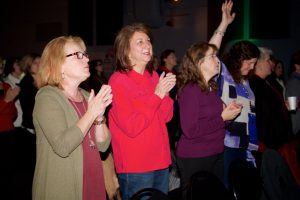
Having worked with Renew Network the last fifteen years, my mind went to the crisis we face in The United Methodist Church. Unable to agree on God’s intention for human sexuality, including basic biblical teaching and theological truths held for thousands of years, the church is in need of a breath of new life.
But this night was focused on the large number of women who had gathered at Mt Bethel. There were women present there who needed to be reminded that in our difficult and seemingly hopeless situations, God wants to breathe into us his “ruah” – breath that is full of new life, hope, restoration, and transformation. He wants to breathe new life into each one of his precious children, each institution, and, yes, even each nation.
For this story speaks to more than the hopeless situation of Israel who were captives of the Babylonians, or even the great impasse of The United Methodist Church. That evening was alive with women who had gathered to worship and receive a word from the Lord that would speak into the difficult, impossible, desperate places of their circumstances. The places only his “ruah” can heal.

Worship and praise is a major part of the ministry. Photos by Donna Lachance.
And just as the Lord God came through for the Israelites in the hopelessness of their captivity, he was present among us that evening breathing life and hope into each woman. The atmosphere was vibrant with the presence of the Holy Spirit.
Leadership Development
Home Grown is just one opportunity in Mt. Bethel’s women’s ministry known as “Rooted” where all women have the opportunity for spiritual growth. The Home Grown ministry encourages women to share their testimonies and gives them opportunities to teach, lead prayer, praise, and worship.
The women who participate in this ministry come from several United Methodist churches, including Canton First UM Church, McEachern UM Church, as well as from other denominations. By joining forces, they have resources that some of the smaller churches would not otherwise have. They have found that each church brings strengths to bless the whole.
The evening I attended, Eastminster Presbyterian Church brought 26 women and their children from The Garden Church, which shelters women who have been victims of abuse, alcohol, drugs, and sex trafficking.
When the time of prayer came, the women gathered in groups of two to pray for one another. It was touching to see the women from Mt. Bethel and other churches pray and minister to each other. The move of the Holy Spirit was powerful as the women confessed to one another and received the truth of God’s deep love and true purpose for each one of their lives.
Developing women’s prayer life is a key component at Mt. Bethel’s women’s ministry. There is a story on its website about one woman whose young daughter developed a rare form of bone cancer resulting in the amputation of a leg. The church prayed with great intensity for the family and their daughter’s crisis. Today, the mother shares her amazing faith, wisdom, and the biblical truth that sustained her and her family. And her daughter, Grace, is sharing her faith and courage with another young girl also named Grace who is battling cancer.
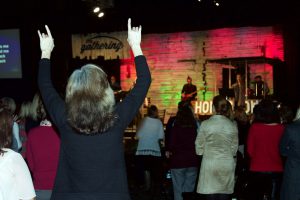
Women with a vision for ministry. Photo by Donna Lachance.
Women in Mission
Reaching out to the women of The Garden Church is just one of the many mission projects that the women of Mt. Bethel and their partnering churches sponsor.
Notable is their participation in a local ministry they birthed, Faith Bridge Foster Care, which has seen such growth it has become its own 501(c)3. This ministry encourages families to foster children and supports them with practical resources. An eight-year-old girl named Charlotte, whose family has fostered several children, told me all about her experience with the program. She is learning at a young age what it means to share the love of Christ and the blessings of her family with others.
Project 82 is a ministry to the 2.5 million orphans in Kenya. The women of Mt Bethel have responded to God’s call to love and care for the vulnerable children of Kenya who have been orphaned by caregivers wiped out by HIV/AIDS, tribal conflict, and poverty-driven diseases. This ministry nurtures orphans holistically to achieve sustainable family solutions. The women of Mt. Bethel have raised money and numerous supplies to provide for the needs of these displaced children.
Whether it is encouraging and resourcing foster care for needy children or the orphaned in Kenya, the women are focused on strengthening the family and building up women who play such an important role in the family. Nicole Taylor, director of women’s ministry at Mt Bethel, helps women find small group ministry for each stage of her life and the life of her family. Soon to launch is a new mentoring program where older women will be paired with younger women to fulfill Paul’s admonition in Titus for the older women to teach the younger.
Through their multifaceted ministry, Mt. Bethel’s women are committed to being salt and light to a hurting world; and they are committed to helping other churches bring “ruah,” a fresh breath of God into their ministries.
Katy Kiser is the Renew Network Team Leader. If you would like to learn more about the dynamic women’s ministry at Mt. Bethel, please contact the Rev. Kelley Brumbeloe or Nicole Taylor at http://mtbethel.org or Katy Kiser at http://renewnetwork.org.

by Steve | Jul 10, 2017 | July-August 2017, Magazine, Magazine Articles
 By James V. Heidinger II-
By James V. Heidinger II-
The Re-Imagining Conference was billed as “A Global Theological Conference by Women, for Men and Women.” Held in Minneapolis on November 4–7, 1993, Re-Imagining was an ecumenical gathering associated with the World Council of Churches for those of the feminist, womanist, or lesbian perspective. With some 2,200 registrants from many mainline denominations, 391 were United Methodist. The Women’s Division (of the General Board of Global Ministries) staff and directors were urged to attend the conference as the quadrennium’s theological workshop with Women’s Division staff and directors’ expenses paid for by the division. In fact, at its spring meeting, the Women’s Division took action to cancel its own staff and directors’ theology workshop and approved in its place involvement of staff and directors in the Re-Imagining event. The Women’s Division acknowledged its full financial support of thirty-six directors, nine staff members, and eleven conference vice-presidents, plus a grant of $2,500 for scholarship support. The Women’s Division’s involvement clearly amounted to official support of the event.
The Good News staff read carefully the transcripts and listened to the recordings from most all of the more than 34 presentations, and we were convinced that this was without doubt the most bizarre, theologically aberrant event we had ever read about, far removed from Christian teaching and tradition. Consider just a few examples:
• Womanist theologian Delores S. Williams said, “I don’t think we need a theory of atonement at all … I don’t think we need folks hanging on crosses and blood dripping and weird stuff.” The statement drew enthusiastic applause.
• A United Methodist clergywoman told a workshop, “The Church has always been blessed by gays and lesbians … witches … shamans … artists.”
• Theologian Mary Hunt said, “I have far more hope in substituting ‘friendship’ as a metaphor for family…. Imagine sex among friends as the norm, young people learning to make friends rather than to date. Imagine valuing genital sexual interaction in terms of whether and how it fosters friendship and pleasure.”
• Melanie Morrison, cofounder of Christian Lesbians Out Together (CLOUT), was given time to celebrate “the miracles of being lesbian, out, and Christian,” and invited all other lesbian, bisexual, and transsexual women to come forward, join hands, and encircle the stage. More than one hundred women responded and Morrison said, “I’m pleased and honored to lead you in prayer and to talk to earth maker Mauna, our creator.”
• Nadean Bishop, the first “out” lesbian minister called to an American Baptist church, said that Mary and Martha in the Bible were not actual sisters but lesbian lovers.
• Chung Hyun Kyung, one of the speakers, explained that Asian theology totally rejects the idea of sinful man, propagating the understanding that humans are good and become better from the god within.
• Chinese feminist Kwok Pui Lan told the group “We cannot have one savior — just like the Big Mac in McDonalds, prepackaged, shipped all over the world. It won’t do. It’s imperialistic.” She offered China’s 722 gods and goddesses as an example of “radical inclusivity.”
• Aruna Gnanadason, staff member of the World Council of Churches, said that the church “centered its faith around the cruel and violent death of Christ on the cross, sanctioning violence against the powerless in society.”
• Virginia Mollenkott said, “We would understand Jesus to be our elder brother, the trailblazer and constant companion for us who are here in time and space, but ultimately one among many brothers and sisters in an eternally, equally worthy siblinghood.”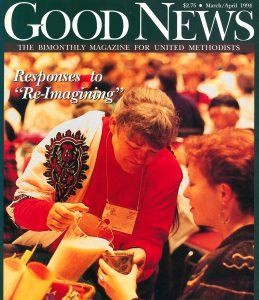
These excerpts reflect the tone and substance of the Re-Imagining Conference. Prayers were offered repeatedly to the goddess Sophia, including the offensive prayer in the communion-like “Service of milk and honey,” which said, “Our sweet Sophia, we are women in your image; with nectar between our thighs we invite a lover, we birth a child.” This blending of sexuality and spirituality seemed more Canaanite than Christian. Not one of more than 34 major speakers represented the orthodox Christian faith as expressed in the classical creeds of the church. The gathering, rather than being ecumenical in terms of focusing on the classic Christian faith, was actually interreligious, with its major emphasis being on non-Christian and other religious traditions.
These excerpts help one understand why the Re-Imagining Conference caused such an ongoing controversy that continued throughout most of 1994. It was a very public conference officially supported by a major United Methodist program agency. It included prayers to and worship focused on the goddess Sophia, as well as the denial of essential Christian doctrinal tenets such as the deity of Christ, his atoning death, the sinfulness of humanity, creation, the authority of Scripture, the church, and the biblical understanding of human sexuality. These doctrines were not only denied, but often done so derisively.
The Good News board took action at its January 1994 meeting, about a month after the conference, asking the Council of Bishops to address this troubling event, believing the conference represented a theological crisis in the church. Our bishops, of course, are charged with the task of guarding the church’s doctrine and teaching. In fact, three retired bishops did speak out. Two invited by Good News (William R. Canon and Earl G. Hunt), wrote articles for Good News magazine. A third, Mack Stokes, penned a lengthy letter to the editor in Good News.
All were deeply distressed about the substance of the conference and its introduction of the goddess Sophia in the worship liturgy. They were retired at the time, but all three went on record publicly, expressing their deep concerns about the conference and Sophia worship.
Unfortunately, the Council of Bishops released no statement about Re-Imagining at its May (1994) meeting but rather created a task force to address the continuing controversy. The task force produced a statement entitled “Biblical Wisdom,” which was adopted unanimously by the Council of Bishops at its November (1994) meeting. The statement noted the existence of considerable theological and doctrinal ferment within The United Methodist Church. Concerning the matter of Sophia, it did state that “Woman Wisdom was never an object of cultic reverence for the Israelites and there are no Biblical warrants for goddess worship.” It went on to affirm that “the worship of Sophia as a goddess is contrary both to the Biblical revelation and our doctrinal standards.” This was a welcomed word for evangelicals to hear. Unfortunately, however, there was no reference to any of the egregious attacks on and denials of the historic doctrines of the church.
Most evangelicals believed that the radical doctrinal views expressed at Re-Imagining were not representative of most United Methodist women in our local church units. Many of them were also distressed by what they heard, but often found it difficult to believe their leadership in New York would be supportive of such a conference. Within two months, UMW leadership released “A Time of Hope – A Time of Threat,” a statement boldly defending the Re-Imagining Conference and claiming critics were denying women the right to do theology.
Then at the November meeting, where the council approved the “Biblical Wisdom” statement, the new president of the council said in his opening address that the bishops needed to help church members get past the “gnat-camel” syndrome (citing Jesus’ rebuke of the scribes and Pharisees for “strain[ing] out a gnat but swallow[ing] a camel” in Matthew 23:24).
He reported receiving hundreds of letters protesting United Methodist involvement in the controversial Re-Imagining Conference — letters expressing concern that some United Methodists had given up devotion to Jesus to worship the goddess Sophia. He went on to say dismissively that he had looked around and did not find one person who had left their devotion to Jesus to worship Sophia. The implication was that the entire matter was of little seriousness, more of a “gnat-camel” kind of issue. His point was that those of us who were upset about Re-Imagining were like the teachers of the law and Pharisees, focusing on minor and insignicant matters while neglecting the more important matters of the law. He said what he did see were drug sales on the streets and children at risk in their schools, concluding: “These are some of the things God is calling us to deal with, but we spend a lot of time fussing within our family. God is calling us to quit that.”
This was a clear example of the trivialization of the role of doctrine in the church: very serious matters, such as goddess worship, the atonement, the incarnation, the sinfulness of humanity, and the deity of Jesus Christ, that resulted in a year-long controversy were viewed merely as “gnat-camel” concerns. According to the president of the United Methodist Council of Bishops, these doctrinal concerns were things we really shouldn’t be “fussing” about within our church family. We should not focus unduly on the president of the council about his statement, because the address of the council’s president generally reflects the consensus of the entire council. But to say we shouldn’t be “fussing” about these kinds of doctrinal issues reflects a serious diminution of the importance and place of doctrine in the church’s life and ministry.
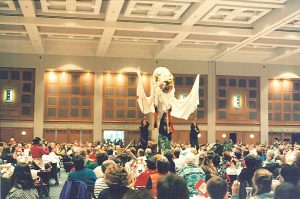
Re-Imagining Conference. Photo by Presbyterian Lay Committee.
Again, the statement by the council’s task force avoided any comment or criticism about the numerous non-Christian teachings at Re-Imagining, including the derision and denial of major Christian doctrines. Many wondered at the time, “If our bishops will not address the many egregious denials of Christian doctrine expressed at the Re-Imagining event, is there any aberration or doctrinal denial they would speak out against in defense of our United Methodist doctrinal standards?” This was all the more disappointing when we reflect that our bishops are charged with being the guardians of the church’s doctrine.
This national conference and our leaders’ reaction to it left many of us even more convinced that matters of doctrine have, indeed, been relegated to a secondary, tangential place in the life of our church.
A Candid Admission
In the Winter 1995 issue of Open Hands, the pro-gay/lesbian journal of the Reconciling Congregations program at the time, Tom Griffith, then pastor of Crescent Heights United Methodist Church in West Hollywood, California, wrote a remarkably candid article entitled, “Three Cheers for Our Evangelical Brothers and Sisters.” Why the praise? Because with our evangelical concerns for “belief in Scriptures and the normative creeds and confessions of faith of the church,” they are calling us to be honest, wrote the Rev. Griffith.
Griffith went on to write, “Now it is our turn to get honest. Although the creeds of our denomination pay lip service to the idea that Scripture is ‘authoritative’ and ‘sufficient both for faith and for practice,’ many of us have moved far beyond that notion in our theological thinking.” Griffith’s words reflected a degree of candor that most evangelicals had never heard before. He wrote, “We are truly deceiving ourselves — and lying to our evangelical brothers and sisters — when we deny the shift we have made.” What Griffith wrote helps us better understand why the Towers Watson Congregational Vitality research study found a persistent lack of trust within the denomination. Griffith got even more specific: “We [liberals] have moved far beyond the idea that the Bible is exclusively normative and literally authoritative for our faith … Furthermore, few of us retain belief in Christ as the sole way to salvation. We trust that God can work under many other names and in many other forms to save people. Our views have changed over the years and evangelicals know it. At least they have the honesty to call us to honesty.”
His candor is commendable. He put his finger on what many of us evangelicals have suspected, and witnessed, for many years — that a number of United Methodist clergy who were trained in the liberal theological tradition may not affirm much of the substance of classic Christianity. Actually, it was not a risky thing for Griffith to write so candidly, because he served in the California-Pacific Annual Conference, one of United Methodism’s most liberal annual conferences. But what it makes clear is that for many liberals, the substance of their preaching is not the great doctrinal themes of the faith: redemption, justification, atonement, sanctification, the Great Commission, and the promised return of Christ. It is not “the faith that was once for all entrusted to the saints” (Jude 3).
It is a trivialization of the church’s doctrine when it can be so casually put aside for something newer, more supposedly relevant and in touch with the times. The claim to have “moved far beyond” Scripture leaves clergy and theologians who do so at liberty to refashion and create a new message free from normative biblical standards. Thus, other things are being preached, much of which would no doubt include good advice, helpful counsel, and words of encouragement and warm religious sentiment. The problem is —these other things are not the faith proclaimed by the church for nearly two millennia. They are not the great doctrinal themes of the great tradition of the church. Nor are these liberal pastors being faithful to the ordination covenant in which they personally affirmed the church’s doctrines to be in harmony with the Scriptures and thus pledged publicly to preach and maintain those doctrines. Griffith knew this, admitting that for many/most liberals, Scripture is no longer “normative” or “sufficient” for faith and practice. That is a notion they have “moved far beyond,” and Griffith was saying it is time for “us liberals” to get honest with evangelicals and admit it.
James V. Heidinger II is the publisher and president emeritus of Good News. A clergy member of the East Ohio Annual Conference, he led Good News for 28 years until his retirement in 2009. Dr. Heidinger is the author of several books, including the recently published The Rise of Theological Liberalism and the Decline of American Methodism (Seedbed). This essay is excerpted from that volume with permission.

by Steve | Jul 10, 2017 | July-August 2017, Magazine, Magazine Articles

Renew leadership, past and present. Liza Kittle (left) and Katy Kiser (right) with Renew founder Faye Short.
By Katy Kiser-
As Dixie Brewster, spokeswoman for the Local Church Committee of the 2016 General Conference of The United Methodist Church, came to the stage to present legislation prepared by the Renew Network to amend Paragraph 256 of the Book of Discipline, women all over the floor of the conference watched with anticipation. An objection was launched by a delegate who did not want the Discipline amended to recognize and encourage alternative ministry in addition to United Methodist Women. But those who spoke in favor had the more cogent arguments. The petition had been fiercely debated in committee yet had passed overwhelmingly without amendments. That day the entire body of delegates in Portland, Oregon, would vote to pass the legislation.
To some, the passage of this change to the Book of Discipline may not have seemed particularly remarkable, but to the women of Renew, this was monumental. As Ruth Burgner of the Mission Society had once written, “If you knew what was going on, this sight might strike you as the stuff short stories and classic tales are made of – the story of a smaller opponent squaring off toe-to-toe with a bigger (and apparently more powerful) one, engaging bravely on behalf of an entire unsuspecting community.”
The passage represented over two and a half decades of conscientious work on the part of women who have played a role in the Renew Network, which is the women’s program arm of Good News.
The network was formed as a two-pronged ministry calling for spiritual renewal for the women of the church and accountability of the Women’s Division (now United Methodist Women Inc.). As founder and president Faye Short remarked in 2002, “These are the ‘grassroots’ of the church, the mainstream Methodists who joyfully embrace and share the great Christian truths that transform lives.” It was by and for these mainstream women that the Renew Network came into being.
Renew traces its roots back to the early 1970s. It was then evangelical women began raising alarms about the resources they were getting from the Women’s Division. Concerns were voiced because the theology, philosophy, and ideology of the Women’s Division were far different from that of the women at the local level. The Esther Action Council and the Good News Women’s Taskforce documented concerns and looked for ways to encourage the grass roots women of the church. These efforts led to the formation of the Renew Network in 1989 under the leadership of Faye Short.
The story of the Renew Network connects to Faye’s story. Many do not realize that Faye was a UMW local, district and conference officer in North Georgia prior becoming president of Renew. She knew first hand the concerns that were arising from evangelical women. When Helen Rhea Stumbo, now chairperson of the Good News board, invited Faye to her first Good News board meeting, Faye told Dr. James V. Heidinger II, then president of Good News, that she had come with a strange burden on her heart for the women of the UM Church.
As the church drifted away from classical orthodoxy, the leadership team Faye had organized began to shine light on the theological error coming out of the Women’s Division. A White Paper titled “Our Basis For Concern” was produced in 2001; it revealed much. Whether it was liberation theology, propagating that all faiths are acceptable ways to God, pro-abortion advocacy, participation in the Re-Imagining movement, tying the mission of the church to the goals of the United Nations, advocating radical feminism, support for a new sexual ethic, or substituting progressive public policy for the proclamation of the gospel, Renew was faithful to report these disturbing developments with the hopes of seeing reform.
Bringing to the conscience of the church that which had the potential of compromising her mission and weakening the proclamation of the gospel was not the only work of the Renew Network. Equally, if not more important, was the development of ministry models and Christ centered program materials. While Renew gave voice to the concerns of evangelical women, they developed alternative resources. These resources encouraged relationship with Jesus and knowledge of Scripture, and a biblical worldview regarding social and political concerns.
A good example of one such resource is the book, Reclaiming the Wesleyan Social Witness: Offering Christ that I co-authored with Faye Short. It put forward a Wesleyan social witness, and proposed a rediscovery of the core of the Wesleyan witness – “saving faith.” Bishop Lindsey G. Davis wrote, “This book offers fresh insights into how our social witness can be transformational and firmly rooted in the Christian faith.”
As we moved out of the late twentieth century and into the next, many churches began Bible studies and alternative women’s ministries. In many parts of the country new forms of vital ministry sprang up; but in other locations innovation was not so easy. Work remained to be done.
In 2008 Faye Short retired as president of Renew and Liza Kittle would take her place and continue the two pronged ministry. Liza was a former radical feminist who came to know Christ in her 30s. She had a real heart for women’s ministry. She wanted all women to experience the life changing transformation that had turned her own life to the Lord.
Prior to becoming president, Liza had served as a press representative, writer and analyst for Renew. Among her reports was an analysis of the Book of Resolutions. After studying the legislation of several General Conferences, it was determined that over 80 percent of the social policy agenda of the UM Church originated from a handful of the liberal boards and agencies in the church. The once six-page addendum of the Book of Discipline had morphed into over 1,000 pages of social justice policy and political agendas that boards and agencies used to fuel their advocacy on Capitol Hill, the White House, and around the world. Her analysis brought important statistical evidence to the eyes of the church.
It was Liza who rewrote and submitted legislation to the 2012 General Conference using language similar to that of United Methodist Men and containing goals associated with the new emphasis on Local Church Revitalization and Growing Vibrant Congregations. Renew’s legislation passed overwhelmingly in the Local Church committee. Unfortunately, due to the late decision from the Judicial Council, time did not allow for the legislation to come to the full floor for a vote. Although this presented a delay of four years, it could not stop the momentum.
After years of involvement with women’s ministry, I became the Renew team leader in 2015. We’ve assembled a team of women pastors and lay teachers to provide devotionals, teachings, Bible studies, and mission ideas. Renew continues to be committed to build and encourage vital women’s programing. Churches and women’s ministries that are making a difference locally and globally are being featured on the Renew website, Facebook page, and in the Good News magazine (see the “Rooted” article in this edition). These stories of authentic women’s ministry are inspiring churches in and beyond Methodism.
The Renew team and all the many women of the network were thrilled when legislation passed at General Conference 2016, amending the Book of Discipline to officially allow alternative women’s ministries. The passage of this legislation represents a new freedom for women within our denomination. With this official endorsement of The United Methodist Church, the hindrances and constraints of the past have been removed. The gates are open for an even brighter future for women’s ministry in the church. The reality for some time has been that churches are offering options that meet the diverse needs of Christian women. We are excited for the days ahead as the Holy Spirit fans the flame of revival and renewal among the women of the UM Church that it may move in ever growing power.
Renew is thankful for having played a part in inspiring biblically based ministries. Yet vigilance remains essential. Renew reported that in 2016 the UMW National produced a spiritual life study on human sexuality that, if embraced, would take the UMW related women and the Church away from the Church’s official biblical sexual ethic.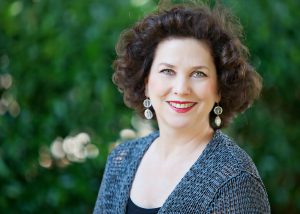
The Rev. Rob Renfroe, current president of Good News, expressed his appreciation for the contribution of Renew to the reform and the renewal of The United Methodist Church when he said: “Renew has been a genuine gift to the women of the church who have looked for balanced, biblical resources to support their spiritual growth and their ministry in the world. In addition, Renew has served as a vigilant and effective force in exposing the radical political agenda behind much of the work of the Women’s Division.”
The women of Renew appreciate this assessment. We view the work of Renew as part of the faithful witness of both men and women within the Good News movement whose purpose is to lead United Methodists to a faithful future.
Katy Kiser is the team leader for Renew Women’s Ministries. For a more detailed account of the history of the RENEW Network go to: www.renewnetwork.org or call 832-381-0331.

by Steve | Jul 10, 2017 | July-August 2017, Magazine, Magazine Articles
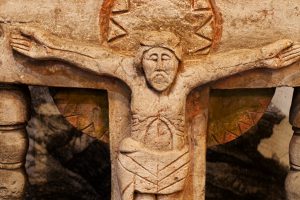
Carved antique statue from limestone of Jesus Christ’s crucifixion.
By Fleming Rutledge-
“God accepts (or loves) you just as you are” has been one of the most frequently used slogans in the church of our day. It has been uttered frequently enough to almost qualify as Scripture, and is often offered up as the essence of the gospel.
But what exactly is meant by acceptance? What is the love of God in its fullest dimensions?
The “just as I am” language was strongly reinforced in the twentieth century by the powerful hymn that Billy Graham always used for his altar calls, “Just as I Am.” The words of the hymn, however, contain something rather more than what is understood by the phrase in general use today.
“Just as I am, without one plea / But that thy blood was shed for me / And that thou bidd’st me come to thee, / O Lamb of God, I come….”
This specific reference to the blood of Christ puts the phrase “just as I am” in a rather more challenging context. In the hymn, the hospitality — the welcome — of God is indeed extended to the “poor, wretched, blind” sinner, conscious of “fightings and fears within, without,” but always within the confession of Christ crucified. Thus the divine welcome already carries with it the implicit presence of righteous judgment. The crucifixion of Christ is incomprehensible unless we understand it in the context of divine justice. When we are reminded that God’s justice and God’s righteousness are the same thing (dikaiosyne), we can see that there is something more involved here than mere acceptance — or, as we might say today, mere “tolerance.” There is a limit to what can be accepted or tolerated, even by flawed human beings, let alone by God. Something has to be made right, justified, rectified (dikaiosis).
The Crucifixion
A declaration of amnesty does not solve the problem of guilt. Something must be done to rectify the situation in order for justice to be served and redemption achieved, something “commensurate with the crime.” We may extrapolate from this something not entirely unlike what Anselm, [noted philosopher and theologian (1033-1109)], means by “satisfaction” — not in his scholastic, schematic terms, but throwing a spotlight on the correspondence between the ponderis peccatum (weight, or gravity, of sin) and the nature of Christ’s gruesome death.
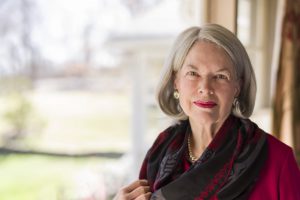
The Rev. Fleming Rutledge
Even more than this, however, is the promise of a complete transformation of human nature by Christ’s victory over the Power of Sin. “Acceptance” is the least of it. Any serious reading of the Old Testament must point to an understanding of God, not superseded, which cannot benignly coexist with us in our condition under Sin. The distinguished writer Julian Green, the first American ever to be elected to the Académie Française, was a devout Roman Catholic. At the age of ninety, he spoke of aspects of his earlier life as a sort of crucifixion, and told an interviewer that “he could now, after a long struggle, await death with serenity.” He was looking forward, he said, “to standing before God … finally to know exactly who I am, free of all the illusions, the little lies, knowing I am going to purgatory, and knowing I will be very happy.”
We don’t have to believe in a detailed medieval version of Purgatory to respond to this. The essential idea is present in the final, climactic book of the Old Testament; like the corrupt sons of Levi, we will all pass through the refiner’s fire: “But who can endure the day of his coming, and who can stand when he appears? For he is like a refiner’s fire and like fullers’ soap; he will sit as a refiner and purifier of silver, and he will purify the sons of Levi and refine them like gold and silver, till they present right offerings to the Lord. Then the offering of Judah and Jerusalem will be pleasing to the Lord” (Malachi 3:2-4).
The placing of Malachi at the end of the Christian Old Testament was a potent move by the early Christian church. The Tanak (Hebrew Scriptures) closes with the Wisdom literature (the Writings), but the Old Testament was shaped in an apocalyptic direction, so that it ends not with the Writings but with the Prophets and, in the very last two verses, “the great and terrible day of the Lord” (Malachi 4:5). The final words of the Old Testament are in the form of promise, though not without a potent reminder of the curse that lies over God’s people. These verses undercut any notion that the human predicament can be resolved by mere “acceptance.” Instead, there is creation ex nihilo, the resurrection of the dead.
The righteousness of God, the dikaiosyne theou, burst forth from the tomb on the day of the resurrection of the Redeemer. “As in Adam all die, even so in Christ shall all be made alive.” The human race is redeemed, not by “acceptance,” but by death and resurrection. This is the fullness of the message of Easter Day.
Fleming Rutledge was one of the first women ordained as an Episcopal priest. She is an author, lecturer, and teacher of other preachers. Her published sermon collections, including And God Spoke to Abraham: Preaching from the Old Testament, have received acclaim across denominational lines. This excerpt is from The Crucifixion: Understanding the Death of Jesus Christ. Reprinted by permission of Eerdmans Publishing.

by Steve | Jul 10, 2017 | July-August 2017, Magazine, Magazine Articles
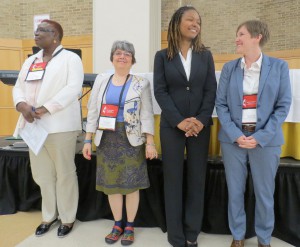
Four clergy candidates who came out as gay in an open letter to The United Methodist Church before the 2016 General Conference were among 28 people approved for ministry by the New York Conference. Photo by Joanne Utley, UMNS.
By Walter Fenton-
The Boards of Ordained Ministry of both the New York and Pacific Northwest Annual Conferences have announced they will not abide by recent rulings of The United Methodist Church’s Judicial Council, the denomination’s final arbiter of church law.
During the clergy session of the Iowa Annual Conference, the executive committee of the board of ordained ministry announced, “[It] would discern the call to ministry of all candidates without regard to race, ethnicity, gender, sexual orientation, marital status, or age and would not consider sexual orientation or gender identity to be sufficient reasons, on their own, to deny any candidate’s ability to live up to our United Methodist standards for fitness, readiness, and effectiveness in ministry.”
The decision, if adopted by the whole board, would make it the third conference in the U.S. to defy not only church law, but also two recent decisions of the Judicial Council upholding the church’s sexual ethics, teachings on marriage, and its ordination standards.
In 2016 both the New York and Pacific Northwest boards, along with five others, had voted to ignore portions of the Book of Discipline when it came to recommending openly gay candidates for ordained ministry. But this April, in two separate decisions (1343 and 1344), the Judicial Council ruled such evasions are unlawful.
In unprecedented moves, both boards said they would not abide by the Judicial Council’s decisions.
The Pacific Northwest Annual Conference Board of Ordained Ministry reaffirmed its position that it “will continue to give all candidates [including LGBTQ candidates] equal consideration [in the ordination process].”
In a brief statement, the New York Annual Conference Board of Ordained Ministry responded: “We reaffirm our statement from March 1, 2016, in its entirety.” In part, that statement read, “Sexual orientation and gender identity are not and will not be considered in the evaluation of candidates by the Board of Ordained Ministry.”
Later that year, the New York Board recommended for commissioning and ordination clergy candidates who had come out as gay in an open letter to the UM Church just days before the 2016 General Conference. Bishop Jane Allen Middleton commissioned and ordained them at the 2016 New York Annual Conference.
The New York board’s action was immediately challenged, but Middleton ruled, “The Board of Ordained Ministry is not required to ‘ascertain’ whether a candidate meets the qualifications for candidacy and ordained ministry, including whether or not she or he is exhibiting ‘fidelity in marriage and celibacy in singleness’ or is a ‘self-avowed practicing homosexual.’”
The Judicial Council, at its April 2017 meeting, countermanded Middleton’s decision. The Council wrote, “[church law] prevents a Board of Ordained Ministry from ignoring [a clergy candidate’s] statements of self-disclosure about any action that violates any portion of church law as is the case for… persons who [self avow] their homosexuality.”
To date, Bishops Thomas Bickerton, Elaine Stanovsky, nor Laurie Haller, respectively the episcopal leaders in the New York, Pacific Northwest, and Iowa Annual Conferences, have responded to their boards’ decisions to defy the will of the denomination’s General Conference, Discipline, and now it’s highest judicial body.
“By now,” said the Rev. Rob Renfroe, president of Good News, “it is obvious progressives in the church are trying to accomplish by fiat what they have failed to accomplish through the church’s time honored processes established by General Conferences. And even worse, it is a very sad day when bishops fail to publicly call upon clergy serving on our boards of ordained ministry to abide by the rulings of our judiciary.”
Walter Fenton is a United Methodist clergy person and an analyst for Good News.

by Steve | Jul 10, 2017 | July-August 2017, Magazine, Magazine Articles
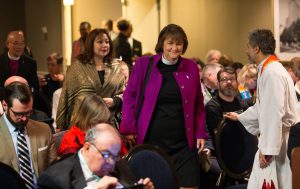
Bishop Karen Oliveto (in purple jacket) enters the hearing room for the United Methodist Judicial Council meeting in Newark, New Jersey. Photo by Mike DuBose, UMNS.
By Thomas Lambrecht-
In April, Good News greeted with some dismay – as did many men and women in the pews – the Judicial Council’s convoluted and ultimately unsatisfactory ruling regarding the Western Jurisdictional Conference’s nomination, election, consecration, and assignment of Bishop Karen Oliveto, an openly gay bishop who is married to another woman, and one who has admitted to presiding at some 50 same-sex weddings.
In its dense, nineteen-page ruling the Council said many of the right things, but as so often is the case with the institutional church, it failed to take the necessary action. It left Oliveto in her office, and essentially remands the case to the Western Jurisdiction’s College of Bishops. And as United Methodists have come to realize, that jurisdiction has a solid track record of defying and even mocking the church’s polity and law when it comes to its sexual ethics and teachings on marriage. Because of past decisions and statements, we have little confidence the Western Jurisdiction bishops will properly handle a case where the facts are obvious to all. It is unlikely that a penalty commensurate to the breach will be meted out swiftly.
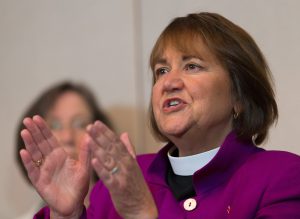
Bishop Karen Oliveto. Photo by Mike DuBose, UMNS.
By allowing Oliveto’s election and assignment to stand, the decision has sown further confusion across the connection. Many rank-and-file United Methodists will conclude no branch of the church is actually willing to defend its biblically rooted, time-honored, and widely shared teachings on sexual practice and marriage. It will deepen the sense of malaise and reinforce the growing opinion that church leaders just continue to “kick the can down the road.” Concerned United Methodists will find it strange that we do not permit our clergy to conduct same-sex unions in our sanctuaries but that a bishop was consecrated after having performed dozens of them and is herself party to one.
Just before the magazine went to press, it was announced that the College of Bishops of the Western Jurisdiction is asking the Judicial Council to reconsider their decision. The Judicial Council is unlikely to reconsider, but this is a way for the process to be drawn out for another six months. The leadership of the jurisdiction will seek to draw out the process as long as they can, putting off that decision by as many as a year to 18 months. Delay tactics in themselves are sending the message that the Western Jurisdiction wants to play by its own rules, unconnected from the rest of the church. But the time clock on the complaint process will run out long before the special General Conference in February 2019.
Despite this frank assessment we remain convinced we have very good reasons to remain hopeful for the people called Methodists.
First, the Judicial Council’s decision has clarified things for the Commission on a Way Forward. If the Western Jurisdiction (and other jurisdictions and annual conferences) persists in defiance, it will make it clear that those actions have placed The United Methodist Church in schism and that it is no longer possible for us to live together in one body. It then becomes incumbent upon the commission to devise a plan of separation that is as fair and equitable as possible. If we can no longer go forward as a church united by its teachings and polity, then we must plan to go our separate ways. A new structure will allow conservative, orthodox, and evangelical congregations to give their full focus to proclaiming the Gospel and growing the kingdom of God through innovative and entrepreneurial forms of ministry for the 21st century.
Second, the Judicial Council clearly and forcefully upheld the principle that a jurisdiction’s bishops, acting on behalf of the whole United Methodist Church, cannot legally consecrate as bishop a person who does not meet the qualifications for office. The Western Jurisdiction had maintained that it could elect and consecrate whoever it thought would be an appropriate bishop in light of their particular context, and that the rest of the church could say nothing about their choice. The ruling recognized that bishops are bishops of the whole church and that jurisdictional bishops are acting on behalf of the whole church when they consecrate a bishop. No jurisdiction or annual conference is completely autonomous. We are part of a connection that is responsible and accountable to each other.
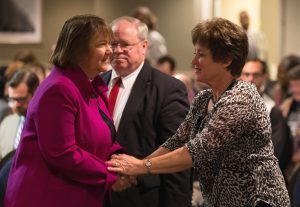
Bishop Karen Oliveto (left) and Dixie Brewster (right) meet at the April Judicial Council meeting. Brewster is the petitioner
questioning whether a gay pastor can serve as a bishop in the UM Church. Photo by Mike DuBose, UMNS
Third, the Judicial Council clarified that “a same-sex marriage license issued by competent civil authorities together with the clergy person’s status in a same-sex relationship is a public declaration that the person is a self-avowed practicing homosexual.” This important ruling will put an end to games that some openly homosexual clergy have been playing by living in a same-sex marriage, yet declining to acknowledge that they are practicing homosexuals. Rather than requiring church authorities to ask intrusive questions about the personal lives and practices of clergy, all that is now necessary for a person to be brought up on a complaint is the public record of being in a same-sex marriage.
“This ruling really does nothing to resolve the tension and impatience and anxiety in our system. It’s not clear-cut enough,” Bishop Bruce R. Ough, president of the United Methodist Church’s Council of Bishops, told the New York Times. “One of the tensions that will play out now within our denomination in the next few months is people will be watching carefully whether the Western Jurisdiction College of Bishops will in fact follow through and do the due process, and do it well.”
As expected, the Judicial Council decision did not resolve the impasse in our denomination over the role of LGBTQ+ persons in the life of the church. The only bodies with the authority to resolve the impasse are the Commission on a Way Forward, the Council of Bishops, and the special General Conference.
The Commission’s final plan is expected to go to the Council of Bishops for approval in May 2018. The Council of Bishops then needs to submit it in legislative form by July 2018 in order to meet the deadlines for the February 2019 General Conference. So we will know a year from now the final proposal that will be put before the called General Conference. Until then, we encourage United Methodists to remain in prayer and continue as members of their local churches, so that the evangelical voice is undiminished in helping to form whatever comes next.
We remain steadfastly confident in the power of the Gospel revealed to us in Scripture. It transforms us, empowers us, and enables us to rise above seemingly insurmountable obstacles.
Thomas Lambrecht is a United Methodist clergy person and vice president of Good News.






 By James V. Heidinger II-
By James V. Heidinger II-








